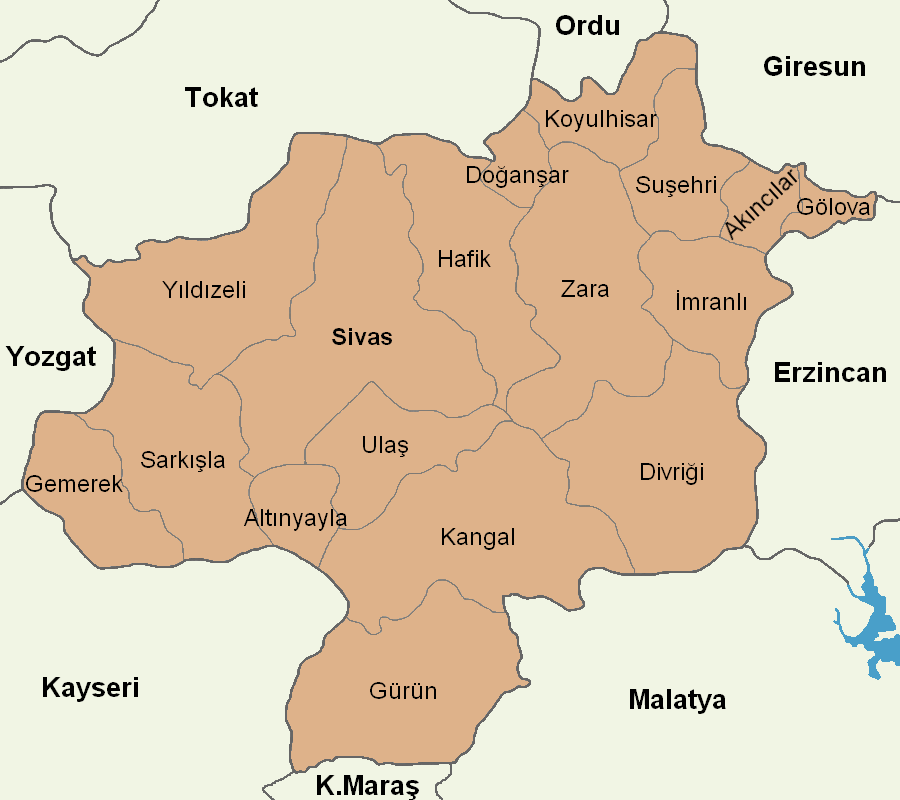|
Emirhan, Zara
Emirhan is a village in the Zara District of Sivas Province in Turkey. It is populated by Kurds Kurds (), or the Kurdish people, are an Iranian peoples, Iranic ethnic group from West Asia. They are indigenous to Kurdistan, which is a geographic region spanning southeastern Turkey, northwestern Iran, northern Iraq, and northeastern Syri ... and had a population of 59 in 2023. References Villages in Zara District {{Sivas-geo-stub Kurdish settlements in Sivas Province ... [...More Info...] [...Related Items...] OR: [Wikipedia] [Google] [Baidu] |
Zara District
Zara District is a Districts of Turkey, district of the Sivas Province of Turkey. Its seat is the town of Zara, Turkey, Zara. Its area is 2,616 km2, and its population is 23,873 (2022). Demographics Zara District has a Sunni Islam, Sunni majority and a Kurdish Alevism, Kurdish Alevi minority. Lom people, Lom families are moreover found in the district. Composition There is one municipality in Zara District:İlçe Belediyesi Turkey Civil Administration Departments Inventory. Retrieved 22 May 2023. * Zara, Turkey, Zara There are 135 villages of Turkey, villages in Zara District: Turkey Civil Administration Departments Inventory. Retrieved 22 May 2023. * Adamfakı ... [...More Info...] [...Related Items...] OR: [Wikipedia] [Google] [Baidu] |
Sivas Province
Sivas Province () is a province of Turkey. It is located in the eastern part of the Central Anatolia region of Turkey. Its area is 28,164 km2 (the second largest province after Konya), and its population is 634,924 (2022). Its adjacent provinces are Yozgat to the west, Kayseri to the southwest, Kahramanmaraş to the south, Malatya to the southeast, Erzincan to the east, Giresun to the northeast, and Ordu to the north. Its capital is Sivas. Most of Sivas Province has the typical continental climate of the Central Anatolian Region, in which summer months are hot and dry, while winter months are cold and snowy. However, the northern part of the province shows some features of the oceanic/ humid subtropical Black Sea climate, while the eastern portion has influences of the Eastern Anatolian highland climate. This province is noted for its thermal springs. Districts Sivas province is divided into 17 districts (capital district in bold): History The route of the Silk R ... [...More Info...] [...Related Items...] OR: [Wikipedia] [Google] [Baidu] |
Kurds
Kurds (), or the Kurdish people, are an Iranian peoples, Iranic ethnic group from West Asia. They are indigenous to Kurdistan, which is a geographic region spanning southeastern Turkey, northwestern Iran, northern Iraq, and northeastern Syria. Consisting of 30–45 million people, the global Kurdish population is largely concentrated in Kurdistan, but significant communities of the Kurdish diaspora exist in parts of West Asia beyond Kurdistan and in parts of Europe, most notably including: Turkey's Central Anatolian Kurds, as well as Kurds in Istanbul, Istanbul Kurds; Iran's Khorasani Kurds; the Caucasian Kurds, primarily in Kurds in Azerbaijan, Azerbaijan and Kurds in Armenia, Armenia; and the Kurdish populations in various European countries, namely Kurds in Germany, Germany, Kurds in France, France, Kurds in Sweden, Sweden, and the Kurds in the Netherlands, Netherlands. The Kurdish language, Kurdish languages and the Zaza–Gorani languages, both of which belong to the Wes ... [...More Info...] [...Related Items...] OR: [Wikipedia] [Google] [Baidu] |
Villages In Zara District
A village is a human settlement or community, larger than a hamlet but smaller than a town with a population typically ranging from a few hundred to a few thousand. Although villages are often located in rural areas, the term urban village is also applied to certain urban neighborhoods. Villages are normally permanent, with fixed dwellings; however, transient villages can occur. Further, the dwellings of a village are fairly close to one another, not scattered broadly over the landscape, as a dispersed settlement. In the past, villages were a usual form of community for societies that practice subsistence agriculture and also for some non-agricultural societies. In Great Britain, a hamlet earned the right to be called a village when it built a church.-4; we might wonder whether there's a point at which it's appropriate to talk of the beginnings of French, that is, when it wa ... ''village'', from Latin ''villāticus'', ultimately from Latin ''villa'' (English ''villa''). Ce ... [...More Info...] [...Related Items...] OR: [Wikipedia] [Google] [Baidu] |


